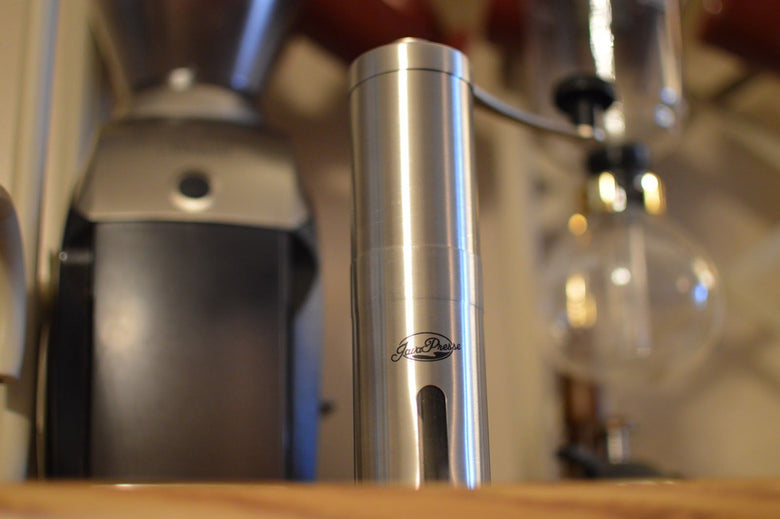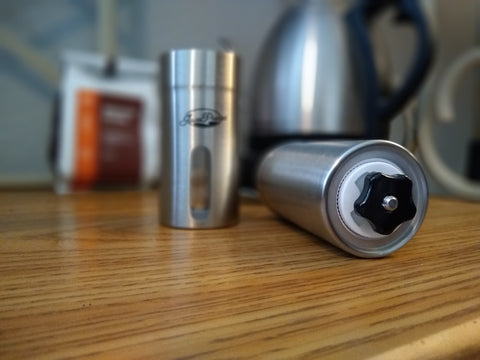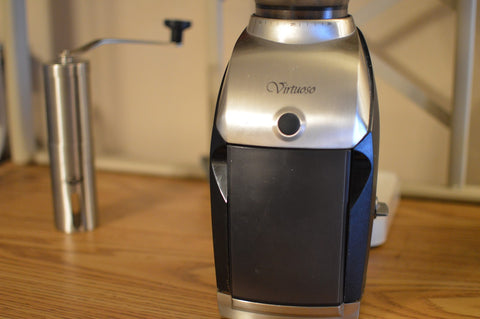Ah, one of the great questions every home coffee brewer must ask: should you get a manual or electric coffee grinder? There’s a lot to consider, but you should have a pretty good idea of which direction you want to go after reading this article.
You’ll have an easier time narrowing down your selection by considering your values and goals before you start eyeing grinders.
Do you want an extremely convenient grinder? Do you want a grinder that can achieve a super-fine espresso grind? Do you want something that doesn’t make a lot of noise? How much are you interested in investing?
Ultimately, how do you want your grinder to shape your daily coffee ritual?
With your values and goals in mind, let’s take a walk through the two types of coffee grinders.
Read: Why Your Grinder Is The Most Important Piece of Coffee Gear
Manual Coffee Grinders
Manual coffee grinders are middle to high performers that produce uniform sized grounds (which is essential to balance and delicious coffee). They can do this consistently for all grind sizes, from French press to espresso, though there aren’t always many grind size settings for micro-adjustments.
You’ll quickly notice that manual coffee grinders can be quite small. Most can be held with one hand, and cranked with the other. If portability for travel brewing is high on your list of values, this is a huge win for manual grinders.
You’ll also notice that manual grinders often feel more durable than their electric counterparts. This is because hand grinders are very simple machines.
You have a tiny hopper that stores beans, a set of burrs that grind coffee beans as they fall through them, and a collection chamber at the bottom. Everything is connected by a single rod that turns the burrs and connects to a handle.
Read: Why Fresh Coffee Is The Best Coffee
Even more complex hand grinders are simply constructed compared to the circuitry and multiple gears of electric grinders, so cleaning is a breeze.
Without an electric power source, grinding coffee is the labor of your hands for manual grinders. It’s not a difficult task and doesn't take long - but the positive benefits are overwhelming.
Unfortunately, grinding by hand for more than a couple people can be a bit tiring. On the bright side, you’ll slowly build up some muscle after repeated grinding, and everyone will be impressed by your stamina when you’re grinding for a group.
Despite the elbow-grease, here’s what makes hand grinding worth it for many of us: excellent manual grinders are not expensive. For $20-30 you can own a reliable hand grinder that will provide you with freshly ground coffee for years and years. The only electric grinders that can compete with that price tag are blade grinders, which I strongly suggest you avoid.
Read: Blades VS Burrs: What Is the Best Type of Coffee Grinder?
Many manual coffee grinders in this price range are more consistent and durable than electric grinders five times their price. If you’re looking to brew better coffee without breaking the bank on a solid, reliable grinder, you’ll be financially satisfied with a hand grinder.
Manual Coffee Grinder Pros
- Mid-High Performance (Consistent, Uniform Grounds)
- Portable
- Durable
- Simple
- Inexpensive
Manual Coffee Grinder Cons
- Elbow-Grease
- Extra Elbow-Grease For Groups
- Limited Grind Size Settings
Electric Coffee Grinders
Since there’s so much variation in electric grinders, I’ll begin with a warning: you’re likely to achieve better results with a manual grinder than with less-expensive (sub $100) electric options.
Low-end electric models are notorious for featuring false burrs, which behave more like dull blade grinders than quality burrs. This fails to produce the uniform coffee grounds that you would expect from a well-crafted device. Poor wiring and flimsy parts are just the cherries on top of the disappointment pie.
I started with a low-end electric grinder that ran me $60. It wasn’t three months before I upgraded to a $25 manual grinder for the improved uniformity and greater grind size range. The difference was very clear in the taste of my coffee.
Read: How To Pick The Perfect Electric Coffee Grinder For You
When designed and built well, electric grinders can be powerhouses that get the job done quickly. Sturdy gears move the burrs, grinding the coffee at the press of a button. Some electric options can dose ground coffee according to weight, freeing you from weighing your coffee beans (if you’re into that).
This high level of consistency and convenience comes at a price, however. If you’re still beginning your journey into the wonderful world of specialty coffee, you probably don’t want to dish out $150 for a grinder. If that’s the case, don’t do it! There are great inexpensive options (hey look, a manual grinder).
High-end electric grinders sometimes come with 40+ grind setting options that range from French press to espresso. Having so many settings opens up the possibility for micro-adjustments to “dial in” your coffee grind size. This is how specialty coffee shops refine their espresso throughout the day to keep it top notch, but it’s not necessary for you at home.
Sadly, most electric grinders generate a lot of noise, and some are downright maddening. However, they sure make grinding coffee for a big group a simple ordeal.
Read: Conical VS Flat Burrs: What You Need To Know
Electric Grinder Pros
- High Performance (High-End Grinders)
- Convenient
- Durable (High-End Grinders)
- Many Grind Size Settings
Electric Grinder Cons
- Low Performance (Low-End Grinders)
- Poorly Built (Low-End Grinders)
- Noisy
- Requires Electricity
- Only High-End Grinders Can Achieve Espresso Grind Size
- Great Performance Is Expensive
Which One Is Right For You?
Remember back to your values and goals for a coffee grinder. Use those as a filter to find out which grinder type will be a better fit for you. I’ll help you break it down.
A manual coffee grinder may be right for you if: you want freshly ground coffee for a better coffee experience, but you don’t want to spend a pretty penny on bells and whistles. You don’t mind a minute of hand labor and enjoy the process of making coffee. You value the ability to take fresh coffee with you wherever you go without having to worry about your grinder breaking.
An electric coffee grinder may be for you if: you’re able to invest some extra money into your coffee setup and want it to be as automatic as possible. You value excellent coffee and want to be able to nerd out over micro-adjustments. You don’t mind being unable to take your grinder on your journeys.
Whether you find yourself on the path towards a manual coffee grinder or an electric one, I know you’ll be exhilarated by the incredible flavors that freshly ground coffee has to offer. If you want to learn more about how to level up your grinding and brewing, check out our Grinding 101 education area.






